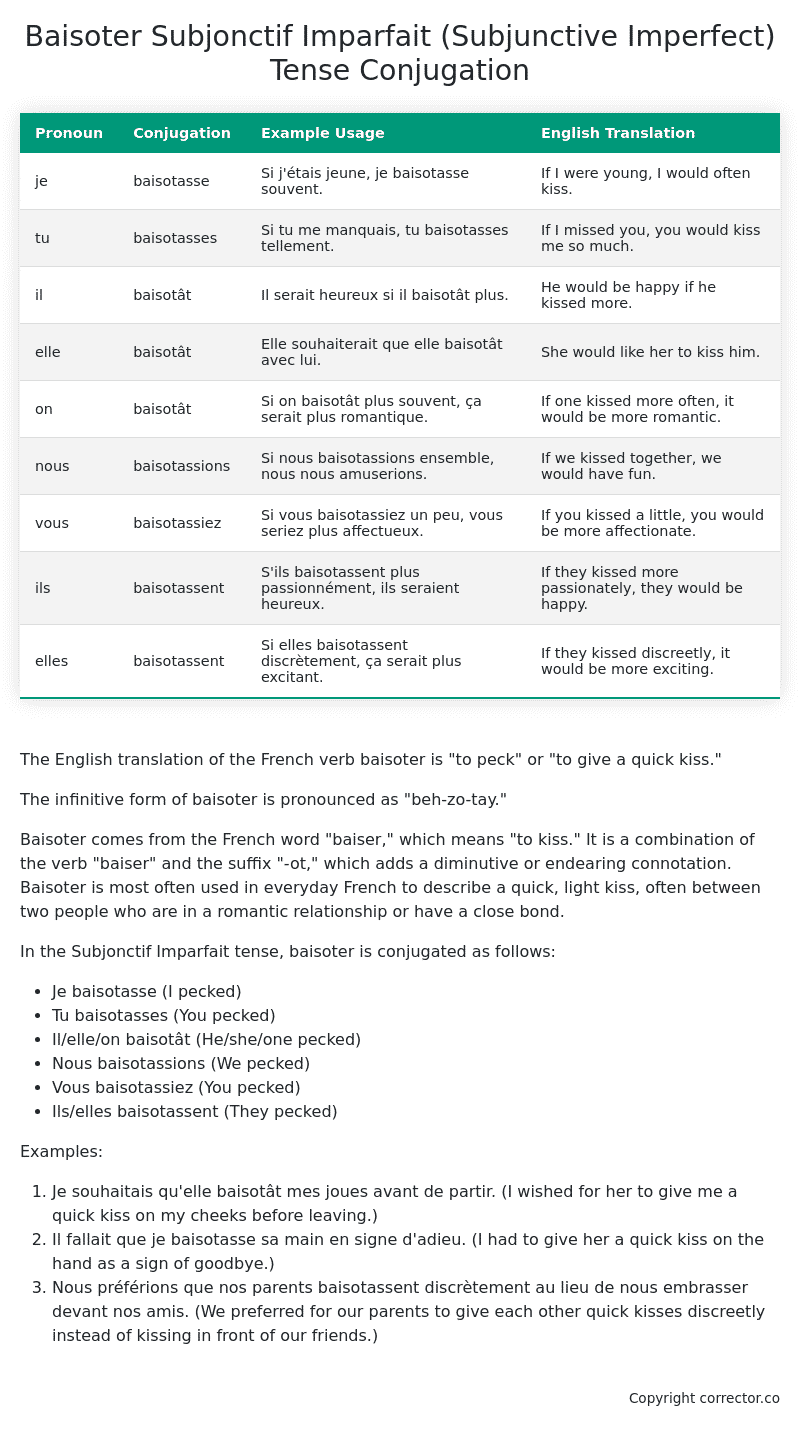Subjonctif Imparfait (Subjunctive Imperfect) Tense Conjugation of the French Verb baisoter
Introduction to the verb baisoter
The English translation of the French verb baisoter is “to peck” or “to give a quick kiss.”
The infinitive form of baisoter is pronounced as “beh-zo-tay.”
Baisoter comes from the French word “baiser,” which means “to kiss.” It is a combination of the verb “baiser” and the suffix “-ot,” which adds a diminutive or endearing connotation. Baisoter is most often used in everyday French to describe a quick, light kiss, often between two people who are in a romantic relationship or have a close bond.
In the Subjonctif Imparfait tense, baisoter is conjugated as follows:
- Je baisotasse (I pecked)
- Tu baisotasses (You pecked)
- Il/elle/on baisotât (He/she/one pecked)
- Nous baisotassions (We pecked)
- Vous baisotassiez (You pecked)
- Ils/elles baisotassent (They pecked)
Examples:
- Je souhaitais qu’elle baisotât mes joues avant de partir. (I wished for her to give me a quick kiss on my cheeks before leaving.)
- Il fallait que je baisotasse sa main en signe d’adieu. (I had to give her a quick kiss on the hand as a sign of goodbye.)
- Nous préférions que nos parents baisotassent discrètement au lieu de nous embrasser devant nos amis. (We preferred for our parents to give each other quick kisses discreetly instead of kissing in front of our friends.)
Table of the Subjonctif Imparfait (Subjunctive Imperfect) Tense Conjugation of baisoter
| Pronoun | Conjugation | Example Usage | English Translation |
|---|---|---|---|
| je | baisotasse | Si j’étais jeune, je baisotasse souvent. | If I were young, I would often kiss. |
| tu | baisotasses | Si tu me manquais, tu baisotasses tellement. | If I missed you, you would kiss me so much. |
| il | baisotât | Il serait heureux si il baisotât plus. | He would be happy if he kissed more. |
| elle | baisotât | Elle souhaiterait que elle baisotât avec lui. | She would like her to kiss him. |
| on | baisotât | Si on baisotât plus souvent, ça serait plus romantique. | If one kissed more often, it would be more romantic. |
| nous | baisotassions | Si nous baisotassions ensemble, nous nous amuserions. | If we kissed together, we would have fun. |
| vous | baisotassiez | Si vous baisotassiez un peu, vous seriez plus affectueux. | If you kissed a little, you would be more affectionate. |
| ils | baisotassent | S’ils baisotassent plus passionnément, ils seraient heureux. | If they kissed more passionately, they would be happy. |
| elles | baisotassent | Si elles baisotassent discrètement, ça serait plus excitant. | If they kissed discreetly, it would be more exciting. |
Other Conjugations for Baisoter.
Le Present (Present Tense) Conjugation of the French Verb baisoter
Imparfait (Imperfect) Tense Conjugation of the French Verb baisoter
Passé Simple (Simple Past) Tense Conjugation of the French Verb baisoter
Passé Composé (Present Perfect) Tense Conjugation of the French Verb baisoter
Futur Simple (Simple Future) Tense Conjugation of the French Verb baisoter
Futur Proche (Near Future) Tense Conjugation of the French Verb baisoter
Plus-que-parfait (Pluperfect) Tense Conjugation of the French Verb baisoter
Passé Antérieur (Past Anterior) Tense Conjugation of the French Verb baisoter
Futur Antérieur (Future Anterior) Tense Conjugation of the French Verb baisoter
Subjonctif Présent (Subjunctive Present) Tense Conjugation of the French Verb baisoter
Subjonctif Passé (Subjunctive Past) Tense Conjugation of the French Verb baisoter
Subjonctif Imparfait (Subjunctive Imperfect) Tense Conjugation of the French Verb baisoter (this article)
Subjonctif Plus-que-parfait (Subjunctive Pluperfect) Tense Conjugation of the French Verb baisoter
Conditionnel Présent (Conditional Present) Tense Conjugation of the French Verb baisoter
Conditionnel Passé (Conditional Past) Tense Conjugation of the French Verb baisoter
L’impératif Présent (Imperative Present) Tense Conjugation of the French Verb baisoter
L’infinitif Présent (Infinitive Present) Tense Conjugation of the French Verb baisoter
Struggling with French verbs or the language in general? Why not use our free French Grammar Checker – no registration required!
Get a FREE Download Study Sheet of this Conjugation 🔥
Simply right click the image below, click “save image” and get your free reference for the baisoter Subjonctif Imparfait tense conjugation!

Baisoter – About the French Subjonctif Imparfait (Subjunctive Imperfect) Tense
Formation
Common Everyday Usage Patterns
Interactions with Other Tenses
Subjonctif Présent
Indicatif Passé Composé
Conditional
Conditional Perfect
Summary
I hope you enjoyed this article on the verb baisoter. Still in a learning mood? Check out another TOTALLY random French verb conjugation!


